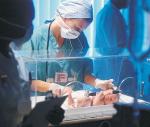Our healthy dose of research funding
Adelaide researchers have crowned a successful year by securing almost $30 million in Federal Government funding. In the National Health and Medical Research Council (NHMRC) round, 26 new project grants were awarded to University of Adelaide medical, dental and biomedical researchers totalling more than $11m over four years. And the university received a further $18.7m over five years from Australian Research Council (ARC) grants for new research projects and infrastructure. Deputy Vice-Chancellor (Research) Professor Neville Marsh was full of praise for the researchers. "We have experienced a stellar performance, especially in terms of the ARC Discovery grants. Thanks to the combined efforts of our researchers, we have significantly improved our success rate which is extremely encouraging for the university," he said. Professor Marsh said the University's ARC Discovery Project success rate was not only 33.8% compared to the national rate of 30.8%, but has doubled last year's funding. "It is a stunning success and reflects our ability to attract large research funding. What is particularly significant is that of our 48 successful ARC Discovery Projects, Early Career Researchers won 12 or 25%. "This is a great indication of the kind of encouragement being given to our ECRs. Their ability is complemented by the achievements of long-standing researchers such as those in physics, chemistry and engineering," he said. Dr Maria Makrides, from the Child Health Research Institute based at the Women's & Children's Hospital and a Senior Research Fellow in the University's Department of Paediatrics, received the largest NHMRC grant of $1.6m over four years (see related story below). ARC Federation Fellow Professor Mark Tester from the Australian Centre for Plant Functional Genomics at the Waite Campus was the big ARC grant winner, receiving $1.45m over five years (see story on opposite page). Professor Marsh said the NHMRC grants clearly illustrate the strength of this institute's research in reproductive medicine, while the healthy development of children has again been recognised with substantial project funding, six new Fellowships, one renewal and four Career Development grants. "The funding of projects in areas as diverse as pregnancy, dental health, methadone treatment and the molecular biosciences testifies to the breadth and depth of our work in the health and medical fields," he said. Meanwhile, the Law School's Dr Judith Gardam and Professor Adrian Bradbrook received $142,466 for a project on The Recognition of Access to Energy Services as an Integral Component of the Human Rights and Sustainable Development Framework. The project will contribute to the fulfilment of Australia's international obligations as a member of the United Nations. Dr Garrett Cullity from the Discipline of Philosophy received $114,515 for research on The morality of Cooperation and Concern. He is one of the key drivers behind the proposed establishment of a new Ethics Centre of South Australia. Some of the other more financially significant grants awarded were: - $989,250 in two NHMRC grants to research teams led by Professor Caroline Crowther, a Senior Lecturer in the Department of Obstetrics and Gynaecology, for work on planned delivery options for women who have had a single previous caesarean section, and on the effects of prenatal corticosteroids on childhood development, behaviour, growth and health.
- $864,610 to Associate Professor Derek Abbott from the School of Electrical and Electronic Engineering to establish a national T-Ray facility at the university through the Linkage Infrastructure Equipment and Facilities scheme.
- $740,000 to Professor Geoff Fincher from the School of Agriculture and Wine for work on plant wall polysaccharides, which are extensively used for food and fibre, and are important dietary components in human nutrition.
- $600,000 to Dr Raymond Protheroe from the School of Chemistry and Physics for research on LUNASKA, a theoretical and experimental project for UHE neutrino astrophysics using a giant radio observatory.
Story by Howard Salkow
|





